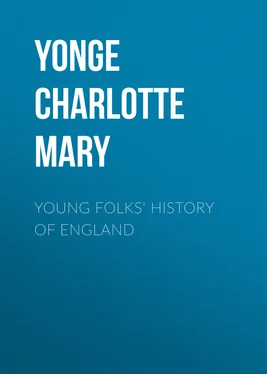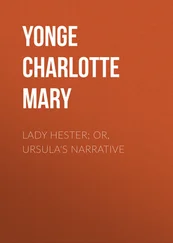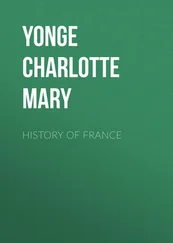Charlotte Yonge - Young Folks' History of England
Здесь есть возможность читать онлайн «Charlotte Yonge - Young Folks' History of England» — ознакомительный отрывок электронной книги совершенно бесплатно, а после прочтения отрывка купить полную версию. В некоторых случаях можно слушать аудио, скачать через торрент в формате fb2 и присутствует краткое содержание. Издательство: Иностранный паблик, Жанр: Альтернативная история, foreign_antique, foreign_prose, Исторические приключения, на английском языке. Описание произведения, (предисловие) а так же отзывы посетителей доступны на портале библиотеки ЛибКат.
- Название:Young Folks' History of England
- Автор:
- Издательство:Иностранный паблик
- Жанр:
- Год:неизвестен
- ISBN:нет данных
- Рейтинг книги:4 / 5. Голосов: 1
-
Избранное:Добавить в избранное
- Отзывы:
-
Ваша оценка:
- 80
- 1
- 2
- 3
- 4
- 5
Young Folks' History of England: краткое содержание, описание и аннотация
Предлагаем к чтению аннотацию, описание, краткое содержание или предисловие (зависит от того, что написал сам автор книги «Young Folks' History of England»). Если вы не нашли необходимую информацию о книге — напишите в комментариях, мы постараемся отыскать её.
Young Folks' History of England — читать онлайн ознакомительный отрывок
Ниже представлен текст книги, разбитый по страницам. Система сохранения места последней прочитанной страницы, позволяет с удобством читать онлайн бесплатно книгу «Young Folks' History of England», без необходимости каждый раз заново искать на чём Вы остановились. Поставьте закладку, и сможете в любой момент перейти на страницу, на которой закончили чтение.
Интервал:
Закладка:
Henry was a builder of beautiful churches. Westminster Abbey, as it is now, was one. And he was so charitable to the poor that, when he had his children weighed, he gave their weight in gold and silver in alms. But he gave to everyone who asked, and so always wanted money; and sometimes his men could get nothing for the king and queen to eat, but by going and taking sheep and poultry from the poor farmers around; so that things were nearly as bad as under William Rufus—because the king was foolishly good-natured. The Pope was always sending for money, too; and the king tried to raise it in ways that, according to Magna Carta, he had sworn not to do. His foreign friends told him that if he minded Magna Carta he would be a poor creature—not like a king who might do all he pleased; and whenever he listened to them he broke the laws of Magna Carta. Then, when his barons complained and frightened him, he swore again to keep them; so that nobody could trust him, and his weakness was almost as bad for the kingdom as John's wickedness. When they could bear it no longer, the barons all met him at the council which was called the Parliament, from a French word meaning talk. This time they came in armor, bringing all their fighting men, and declared that he had broken his word so often that they should appoint some of their own number to watch him, and hinder his doing anything against the laws he had sworn to observe, or from getting money from the people without their consent. He was very angry; but he was in their power, and had to submit to swear that so it should be; and Simon de Montfort, Earl of Leicester, who had married his sister, was appointed among the lords who were to keep watch over him. Henry could not bear this; he felt himself to be less than ever a king, and tried to break loose. He had never cared for his promises; but his brave son Edward, who was now grown up, cared a great deal: and they put the question to Louis, King of France, whether the king was bound by the oath he had made to be under Montfort and his council. This Louis was son to the one who had been driven back by Hubert de Burgh. He was one of the best men and kings that ever lived, and he tried to judge rightly; but he scarcely thought how much provocation Henry had given, when he said that subjects had no right to frighten their king, and so that Henry and Edward were not obliged to keep the oath.
Thereupon they got an army together, and so did Simon de Montfort and the barons; and they met at a place called Lewes, in Sussex. Edward got the advantage at first, and galloped away, driving his enemies before him; but when he turned round and came back, he found that Simon de Montfort had beaten the rest of the army, and made his father and uncle Richard prisoners. Indeed, the barons threatened to cut off Richard's head if Edward went on fighting with them; and to save his uncle's life, he too, gave himself up to them.
Simon de Montfort now governed all the kingdom. He still called Henry king, but did not let him do anything, and watched him closely that he might not get away; and Edward was kept a prisoner—first in one castle, then in another. Simon was a good and high-minded man himself, who only wanted to do what was best for everyone; but he had a family of proud and overbearing sons, who treated all who came in their way so ill, that most of the barons quarreled with them. One of these barons sent Edward a beautiful horse; and one day when he was riding out from Hereford Castle with his keepers, he proposed to them to ride races, while he was to look on and decide which was the swiftest. Thus they all tired out their horses, and as soon as he saw that they could hardly get them along, Edward spurred his own fresh horse, and galloped off to meet the friends who were waiting for him. All who were discontented with the Montforts joined him, and he soon had a large army. He marched against Montfort, and met him at Evesham. The poor old king was in Montfort's army, and in the battle was thrown down, and would have been killed if he had not called out—"Save me, save me, I am Henry of Winchester." His son heard the call, and, rushing to his side, carried him to a place of safety. His army was much the strongest, and Montfort had known from the first that there was no hope for him. "God have mercy on our souls, for our bodies are Sir Edward's," he had said; and he died bravely on the field of battle.
Edward brought his father back to reign in all honor, but he took the whole management of the kingdom, and soon set things in order again— taking care that Magna Carta should be properly observed. When everything was peaceful at home, he set out upon a Crusade with the good King of France, and while he was gone his father died, after a reign of fifty-six years. There only three English Kings who reigned more than fifty years, and these are easy to remember, as each was the third of his name—Henry III., Edward III., and George III. In the reign of Henry III. the custom of having Parliaments was established, and the king was prevented from getting money from the people unless the Parliament granted it. The Parliament has, ever since, been made up of great lords, who are born to it: and, besides them, of men chosen by the people in the counties and towns, to speak and decide for them. The clergy have a meeting of their own called Convocation; and these three—Clergy, Lords, and Commons—are called the Three Estates of the Realm.
CHAPTER XV
EDWARD I., LONGSHANKS
A.D. 1272—1307
The son of Henry III. returned from the Holy Land to be one of our noblest, best, and wisest kings. Edward I.—called Longshanks in a kind of joke, because he was the tallest man in the Court—was very grand-looking and handsome; and could leap, run, ride, and fight in his heavy armor better than anyone else. He was brave, just, and affectionate; and his sweet wife, Eleanor of Castille, was warmly loved by him and all the nation. He built as many churches and was as charitable as his father, but he was much more careful to make only good men bishops, and he allowed no wasting or idling. He faithfully obeyed Magna Carta, and made everyone else obey the law—indeed many good laws and customs have begun from this time. Order was the great thing he cared for, and under him the English grew prosperous and happy, when nobody was allowed to rob them.
The Welsh were, however, terrible robbers. You remember that they are the remains of the old Britons, who used to have all Britain. They had never left off thinking that they had a right to it, and coming down out of their mountains to burn the houses and steal the cattle of the Saxons, as they still called the English. Edward tried to make friends with their princes—Llewellyn and David—and to make them keep their people in order. He gave David lands in England, and let Llewellyn marry his cousin, Eleanor de Montfort. But they broke their promises shamefully, and did such savage things to the English on their borders that he was forced to put a stop to it, and went to war. David was made prisoner, and put to death as a traitor; and Llewellyn was met by some soldiers near the bridge of Builth and killed, without their knowing who he was. Edward had, in the meantime, conquered most of the country; and he told the Welsh chiefs that, if they would come and meet him at Caernarvon Castle, he would give them a prince who had been born in their country—had never spoken a word of any language but theirs. They all came, and the king came down to them with his own little baby son in his arms, who had lately been born in Caernarvon Castle, and, of course, had never spoken any language at all. The Welsh were obliged to accept him; and he had a Welsh nurse, that the first words he spoke might be Welsh. They thought he would have been altogether theirs, as he then had an elder brother; but in a year or two the oldest boy died; and, ever since that time, the eldest son of the King of England has always been Prince of Wales.
Читать дальшеИнтервал:
Закладка:
Похожие книги на «Young Folks' History of England»
Представляем Вашему вниманию похожие книги на «Young Folks' History of England» списком для выбора. Мы отобрали схожую по названию и смыслу литературу в надежде предоставить читателям больше вариантов отыскать новые, интересные, ещё непрочитанные произведения.
Обсуждение, отзывы о книге «Young Folks' History of England» и просто собственные мнения читателей. Оставьте ваши комментарии, напишите, что Вы думаете о произведении, его смысле или главных героях. Укажите что конкретно понравилось, а что нет, и почему Вы так считаете.












